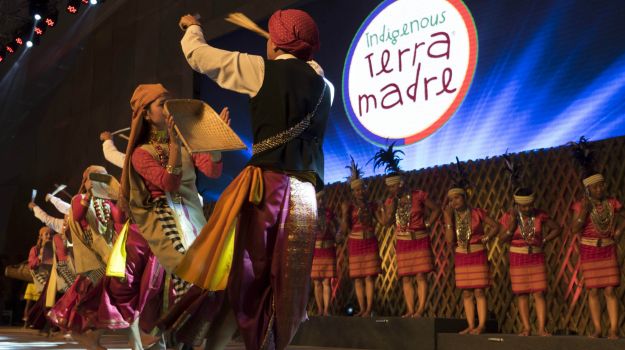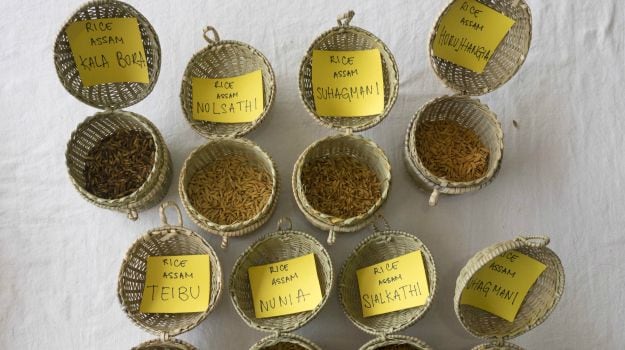Image credit: Carla CapalboSix hundred representatives of native communities around the world recently gathered in Shillong, northeastern India, for Indigenous Terra Madre (ITM), an event that helps forge a global network of indigenous peoples, activists and their supporters.The event, under the auspices of Slow Food, takes place every four years. This ITM was held in cooperation with the Indigenous Partnership for Agrobiodiversity and Food Sovereignty (supported by the Christensen Fund) and was hosted by the Indian region of Meghalaya and the North East Slow Food Agrobiodiversity Society. Their individual stories vary but are closely linked.
Focus on food sovereigntyChi Suwichan is a member of the Karen tribe of northern Thailand. His people have lived there for centuries, yet the current Thai government does not recognize them as citizens. Maria Bautista Leon, from the Tzeltal indigenous people of Chiapas, Mexico, and a descendant of the Mayans, is protesting the increase of monoculture and the threat of genetically modified corn in her country. Winona LaDuke, a Native American activist of the Ojibwe tribe, has led battles to save her people's local wild rice as she fights for tribal land claims.The focus at ITM is on environmental, biodiversity, food sovereignty and other sustainability issues linked to these communities' way of life, many of which are increasingly under threat. Members of 140 tribes from 58 countries on five continents attended the 5-day event. Open meetings were arranged by themes, including: learning about food systems from matriarchal societies; building bridges between the private sector and indigenous communities; oral history; pastoralists and their challenges; and the future of food.Prince Charles, who has long been a champion of these kinds of issues, sent a video message for the inauguration. "In our modern world, we are totally disconnected from indigenous knowledge," he said. "The essential unity of things as reflected in nature has become dangerously fragmented. The modern world has shifted away from the holistic indigenous cosmology of seeing ourselves within nature to us standing apart from it. We must look after the earth and help it maintain its health and balance." He suggests we listen to indigenous wisdom for the guidance we need to live in harmony with our planet.
 Image credit: Carla CapalboUniting voices for changeCarlo Petrini, who founded Slow Food 30 years ago in Italy and later created Terra Madre to bring together food-making communities from all corners of the globe, also spoke at the meeting. "Our planet is suffering from the greed of those who want to steal its resources," he began. "We hope the Climate Change conference in Paris will make constructive decisions about this disaster. Our food has lost its value. It has been turned into a commodity to be paid as little as possible for. The truth is that 500 million small household food communities feed 70 percent of the world, yet they are treated the worst of all. The large multinationals claim ownership of their seeds and promote intensive, genetically modified farming and monocultures that are destroying the lives of these indigenous food-producing communities. There can be no sustainability if we don't change this model."With most delegates attending in their native dress, the get-together was colorful, musical and emotional. At large communal meals hosted by local chefs (the most memorable was an invitation to dinner for everyone at the Shillong Sikh's Gurdwara temple), there was plenty of time for people to share stories, problems and solutions."My people's history was written in song, in folk tales and by calling the mountains and rivers names in our language," said Suwichan, one of 500,000 Karen in northern Thailand. "We used traditional natural farming, with a seven-year rotation for our rice and other crops. But since the government has declared our area a national park we are no longer allowed to practice this kind of farming, which has forced us to use chemical fertilizers. We lived in symbiosis with the forest and relied on it for wild plants and foods as we protected it. Now our forest has been designated a wildlife reserve and we are no longer allowed to take anything out of it. But they never consulted us about this, they never consulted our ancestors or our community leaders. My parents say we are now like orphan chickens, that we each have a small voice, but together with the others at ITM it may become louder."'A universal language'"As Carlo Petrini says, we need to defend our native plants and animal breeds, our flavors and methods, for they are a universal language," LaDuke said. "We have fought to reject the patents industrial agriculture has tried to put on our indigenous varieties. Our food is pre-colonial, pre-GMO and pre-petroleum. We are part of a movement to stop the theft of our seeds and land, and the theft of our economies. We fight against the politics of those who try to oppress us, and the closer the links between all of our tribes can get, the stronger our resistance will be."
Image credit: Carla CapalboUniting voices for changeCarlo Petrini, who founded Slow Food 30 years ago in Italy and later created Terra Madre to bring together food-making communities from all corners of the globe, also spoke at the meeting. "Our planet is suffering from the greed of those who want to steal its resources," he began. "We hope the Climate Change conference in Paris will make constructive decisions about this disaster. Our food has lost its value. It has been turned into a commodity to be paid as little as possible for. The truth is that 500 million small household food communities feed 70 percent of the world, yet they are treated the worst of all. The large multinationals claim ownership of their seeds and promote intensive, genetically modified farming and monocultures that are destroying the lives of these indigenous food-producing communities. There can be no sustainability if we don't change this model."With most delegates attending in their native dress, the get-together was colorful, musical and emotional. At large communal meals hosted by local chefs (the most memorable was an invitation to dinner for everyone at the Shillong Sikh's Gurdwara temple), there was plenty of time for people to share stories, problems and solutions."My people's history was written in song, in folk tales and by calling the mountains and rivers names in our language," said Suwichan, one of 500,000 Karen in northern Thailand. "We used traditional natural farming, with a seven-year rotation for our rice and other crops. But since the government has declared our area a national park we are no longer allowed to practice this kind of farming, which has forced us to use chemical fertilizers. We lived in symbiosis with the forest and relied on it for wild plants and foods as we protected it. Now our forest has been designated a wildlife reserve and we are no longer allowed to take anything out of it. But they never consulted us about this, they never consulted our ancestors or our community leaders. My parents say we are now like orphan chickens, that we each have a small voice, but together with the others at ITM it may become louder."'A universal language'"As Carlo Petrini says, we need to defend our native plants and animal breeds, our flavors and methods, for they are a universal language," LaDuke said. "We have fought to reject the patents industrial agriculture has tried to put on our indigenous varieties. Our food is pre-colonial, pre-GMO and pre-petroleum. We are part of a movement to stop the theft of our seeds and land, and the theft of our economies. We fight against the politics of those who try to oppress us, and the closer the links between all of our tribes can get, the stronger our resistance will be."
Focus on food sovereigntyChi Suwichan is a member of the Karen tribe of northern Thailand. His people have lived there for centuries, yet the current Thai government does not recognize them as citizens. Maria Bautista Leon, from the Tzeltal indigenous people of Chiapas, Mexico, and a descendant of the Mayans, is protesting the increase of monoculture and the threat of genetically modified corn in her country. Winona LaDuke, a Native American activist of the Ojibwe tribe, has led battles to save her people's local wild rice as she fights for tribal land claims.The focus at ITM is on environmental, biodiversity, food sovereignty and other sustainability issues linked to these communities' way of life, many of which are increasingly under threat. Members of 140 tribes from 58 countries on five continents attended the 5-day event. Open meetings were arranged by themes, including: learning about food systems from matriarchal societies; building bridges between the private sector and indigenous communities; oral history; pastoralists and their challenges; and the future of food.Prince Charles, who has long been a champion of these kinds of issues, sent a video message for the inauguration. "In our modern world, we are totally disconnected from indigenous knowledge," he said. "The essential unity of things as reflected in nature has become dangerously fragmented. The modern world has shifted away from the holistic indigenous cosmology of seeing ourselves within nature to us standing apart from it. We must look after the earth and help it maintain its health and balance." He suggests we listen to indigenous wisdom for the guidance we need to live in harmony with our planet.

Advertisement








